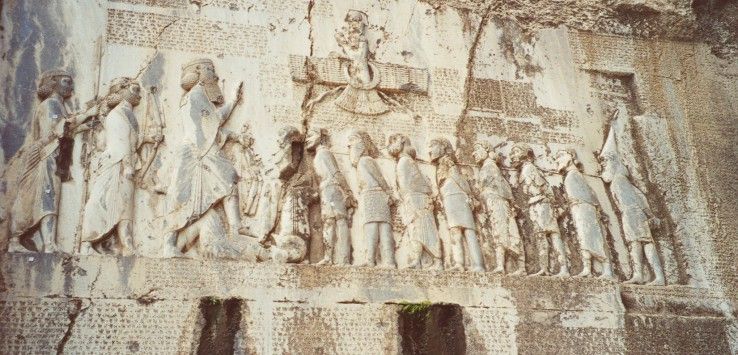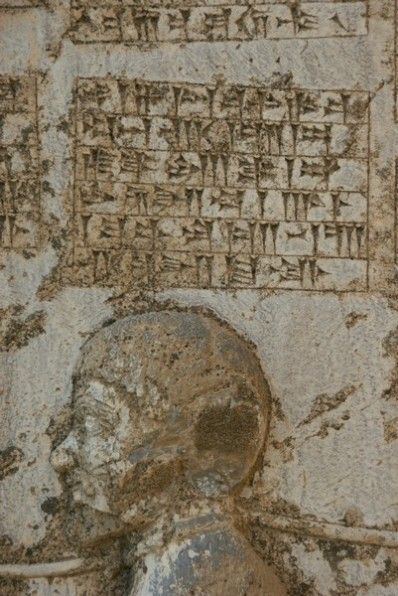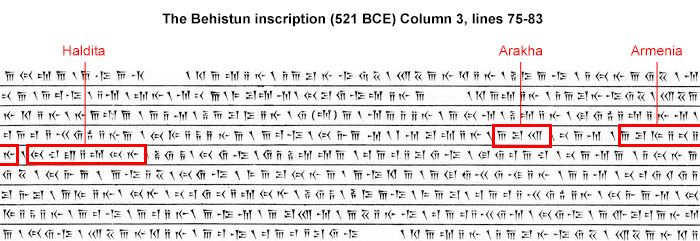The Last King of Babylon – The Armenian Rebel Arakha
 •
by
•
by Rodica Bostanica

The last independent king of Babylon was an Armenian by the name of Arakha also known as Nebuchadnezzar IV.
After the Achaemenid conquest of Babylon in 539 BC, several attempts were made by the Babylonians to rebel against the Persian conquerors. The first attempt was led by Nidintu-Bêl and was violently suppressed by Darius the Great. The last resistance however was led by an Armenian by the name of Arakha who after ascending the throne took on the name of Nebuchadnezzar IV.
In the ancient Iranian town Behistun there are several ancient monuments, including one with a famous inscription by Darius I. There the accounts of Arakha’s rebellion and subsequent suppression by Darius led by his bow carrier Intaphrenes is recorded as follows:

"" A certain man named Arakha, an Armenian, son of Haldita, rebelled in Babylon. At a place called Dubâla, he lied unto the people, saying: ‘I am Nebuchadnezzar, the son of Nabonidus.’ Then did the Babylonian people revolt from me and they went over to that Arakha. He seized Babylon, he became king in Babylon.
Then did I send an army unto Babylon. A Persian named Intaphrenes, my servant, I appointed as their leader, and thus I spoke unto them: ‘Go, smite that Babylonian host which does not acknowledge me.’
Then Intaphrenes marched with the army unto Babylon. Ahuramazda brought me help; by the grace of Ahuramazda Intaphrenes overthrew the Babylonians and brought over the people unto me. On the twenty-second day of the month Markasanas they seized that Arakha who called himself Nebuchadnezzar, and the men who were his chief followers.
Then I made a decree, saying: ‘Let that Arakha and the men who were his chief followers be crucified in Babylon!’ ""

What is interesting about this account apart from the fact that apparently an Armenian man tried to free Babylon from Persian occupation, are the names of the Armenian rebel and his father. Arakha is clearly an Armenian name, it translates from Armenian as ‘crown prince’ and a variant Ara is still a popular name in Armenia. Perhaps more interesting is the name of his father ‘Haldita’ as described by Darius’s inscription at Behistun. It clearly bears the name of the supreme Urartian deity Haldi. The suffix –ta possibly derives from the Armenian “tal” –“to give”. Just as today one would say “Astvats-ta” meaning “God give”, in the olden days when Armenians worshiped Haldi, they would most likely say “Haldi-ta”. Which makes Haldita a “God’s gift”, a familiar name in many languages, f.e. a Slavic variant is Bogdan (God given) or the Armenian variant Astvatsatur.


Comments
Interesting.
nice
I wonder how much of this is history, and how much is mythology?
Not that it matters, I like mythology more than history.
Good.
C+V
interesting 🙂
o7
### Resource war - last quarter ###
https://www.erepublik.com/en/article/resource-wars-last-quarter-2599333/1/20
Interesting article, love history.
P.S
We also have a saying: "Ako Bog da" (If God gives).
v
v
V
c
v
o7
26
o7
V
IVVVI
o/
.
nu
v
v
v
v
v
v